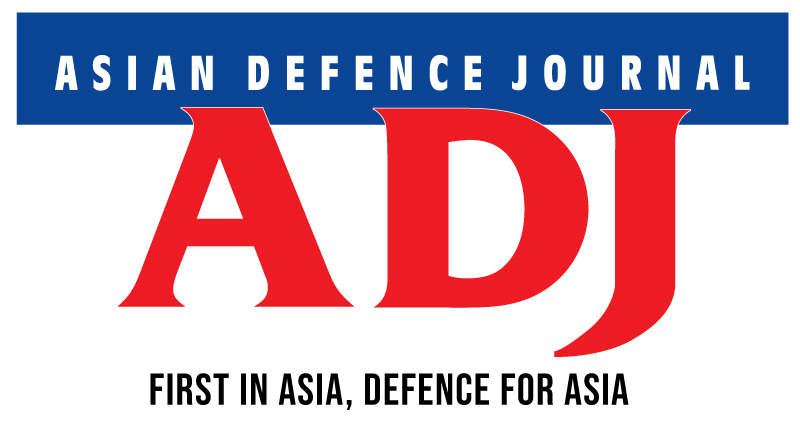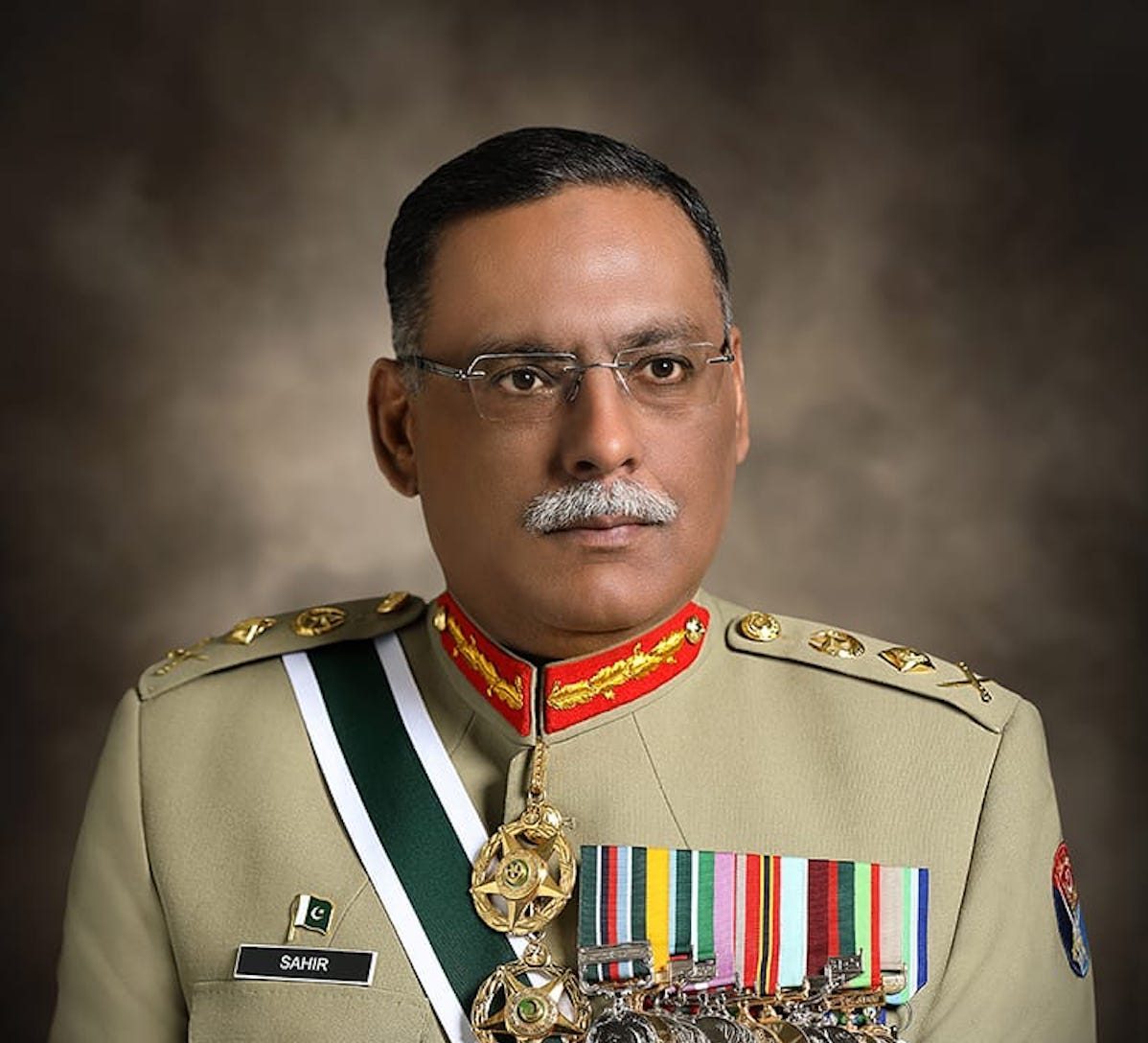General Sahir Shamshad Mirza, Chairman Joint Chiefs of Staff Committee, Pakistan Armed Forces
STRATEGICALLY located at the crossroads of South and Central Asia, Pakistan has been a pivotal player in global and regional peace and stability. Over the years, Pakistan has implemented and engaged in a combination of military operations, socio-political measures and international cooperation to address challenges that come with them. In his views on the way forward for the Pakistan Armed Forces (PAF), General Sahir talks to the Asian Defence Journal about the challenges and modernisation plans of the armed forces, as well as steps taken to keep abreast with technological advancements. He also speaks on regional and international diplomacy, and Pakistan’s commitment in counter-terrorism efforts.
ADJ: The International Defence Exhibition and Seminar (IDEAS) 2024 is a premier platform for showcasing Pakistan’s defence technology advancements. How does collaboration between the armed forces and domestic defence industries contribute to Pakistan’s self-reliance in national security?
CJCSC: Since our independence, Pakistan’s armed forces inherited very meagre defence capability/resources. This made us heavily reliant on imports of defence articles. However, over the years Pakistan gradually diverted its focus towards self-reliance and invested heavily in indigenous defence industries. In recent two decades we have not only achieved self-reliance in our defence needs, which can meet our emerging requirements, the industry has also been able to export our defence articles to other countries. Our self-reliance and indigenisation remain especially attributable to, at times, denial regimes imposed on us for purchase of critical defence needs. Notwithstanding the above, by collaborating with the domestic industry, the armed forces are contributing towards the advancement of technological innovations specifically suited to Pakistan’s unique requirements.
ADJ: With the ever-evolving global security landscape, what emerging technologies do you see playing a crucial role in strengthening Pakistan’s defence capabilities in the coming years?
CJCSC: The future war is going to be different with the character of war witnessing a transformational shift. Contemporaries with superior utilisation of the OODA loop, enabled by niche technologies like artificial intelligence, cyber, electronic warfare, unmanned aerial vehicles, precision munitions, quantum computing, et cetera will have a clear advantage over their adversaries while utilising the entire spectrum of warfare. These technologies, in the future years, will play a decisive role in the outcome of conflict. We are already at pace with emerging technologies and our focus remains on staying abreast so as to skillfully handle evolving security challenges. Drawing lessons from the recent conflicts (Armenia-Azerbaijan and Russia-Ukraine, et cetera) we have embarked on an exhaustive yet focused development regime in these domains. Future developments and applications of these technologies are, we consider, crucial in determining Pakistan’s approach to national security.
ADJ: In recent years, there has been a growing emphasis on indigenous development of defence equipment. How can Pakistan ensure a balance between acquiring advanced foreign technology and fostering domestic innovation?
CJCSC: To ensure a balance between acquiring advanced foreign technology and fostering domestic innovation, Pakistan adopts a dual strategy that involves leveraging foreign partnerships for cutting-edge technologies while simultaneously investing in and nurturing our indigenous defence industry. This approach allows us to integrate the latest advancements into our defence capabilities, ensuring immediate operational readiness, while also promoting local research and development, which builds long-term self-reliance and technological expertise within the country. Furthermore, transfer of technology agreements, collaborative research and development, and public-private partnerships are few facets which also help in achieving the desired balance between foreign reliance and domestic innovation.
ADJ: IDEAS not only showcases technology but also fosters collaboration between regional militaries. How can such events contribute to building trust and promoting regional security cooperation?
CJCSC: Events like IDEAS play a crucial role in building trust and promoting regional security cooperation by providing a platform for open dialogue, knowledge exchange and collaborative engagements among regional militaries. Accordingly, the exhibition brings together stakeholders and companies from diverse defence industries. The occasion provides a neutral platform and an opportunity for government-to-government, business-to-government and business-to-business interactions, joint ventures and investment in the defence production sector. The agreement between Turkish Aerospace and NESCOM Pakistan regarding development of a long-endurance drone was also achieved through a similar event. Likewise, joint ventures between Pakistan, China and Saudi Arabia pertaining to the development of the fifth generation fighter aircraft, main battle tank and modern artillery have been materialised on the heels of such events. Such events offer a useful platform for encouraging cooperation, openness and communication – all of which are critical for establishing confidence and strengthening regional security.
ADJ: IDEAS attracts participation from various countries. How can such events facilitate knowledge exchange and collaboration on issues like disaster relief and humanitarian operations?
CJCSC: Pakistan has always been on the forefront of providing humanitarian assistance during disaster relief operations, such as the February 2023 earthquake in Turkiye and the provision of relief goods to Gaza. COP 26 also revealed that shortage of funds in the Green Climate Fund is likely to persist, and therefore events like IDEAS have become crucial to offer innovative/cost-effective solutions to tackle the adverse effects of climate change. Furthermore, IDEAS, by attracting participation from various countries, serves as an invaluable platform for facilitating knowledge exchange and collaboration on critical issues like disaster relief and humanitarian operations.
Networking and knowledge exchange is one of the key objectives of IDEAS which is characterised by an international seminar conducted during the event. During the seminar, eminent speakers, experts and representatives from the public and private sectors share their views on relevant topics. Moreover, the exhibition showcases cutting-edge solutions, technologies, and equipment for disaster relief and humanitarian operations, enabling participants to explore new options.
ADJ: The Pakistani military has a long history of humanitarian service. How does Pakistan balance its focus on national defence with its commitment to support communities in times of crises?
CJCSC: Pakistan Army, within the ambit of the Constitution of Islamic Republic of Pakistan, is mandated to act in aid of civil power, when required. The Pakistani Military effectively balances national defence with its commitment to humanitarian service by integrating disaster response and community support into its core operations. The military especially plays a crucial role in disaster relief efforts due to its logistical capabilities and organisational structure. For example, the Pakistan Army has been actively involved in flood relief operations and earthquake recovery. Moreover, the National Disaster Management Authority (NDMA), has been established to oversee disaster management and coordinate relief efforts. The NDMA works in conjunction with provincial disaster management authorities to ensure a structured and efficient response to emergencies.
ADJ: What are your hopes for the future of IDEAS and its role in shaping the landscape of regional defence cooperation?
CJCSC: My hopes for the future of IDEAS are that it continues to evolve as a premier platform for fostering regional defence cooperation innovation and collaboration. By bringing together military leaders, defence experts and industry professionals from across the region, IDEAS can play a pivotal role in addressing shared security challenges, promoting mutual trust and enhancing collective capabilities. I envision that the future of IDEAS will be characterised by a greater emphasis on collaborative approaches to regional security challenges, the integration of advanced technologies, and a holistic focus on both defence and humanitarian needs. These developments will help shape a more cooperative and adaptive regional defence landscape.
ADJ: Military diplomacy is an important tool to encourage military cooperation. How does the PAF maintain foreign military cooperation, especially balancing its relationship with the US Armed Forces and China’s People’s Liberation Army?
CJCSC: Military diplomacy remains an important facet of Pakistan’s foreign policy in pursuit of our national interests. Our outreach in terms of military diplomacy and military-to-military relations complement the State’s efforts to maintain a balance in the diplomatic domain. Pakistan has maintained a positive trajectory of foreign military cooperation with friendly militaries over the years through engaging in high-level interactions, staff talks, institutional forums, bilateral and multilateral exercises, training activities and military assistance. Presently, Pakistan’s military interacts with sixty-one countries either in defence and security talks, exercises, seminars or joint exchange programs.
Remaining within the dictates of our foreign policy parameters which enunciate friendliness and goodwill towards all nations of the world, Pakistan considers China and the US as two major defence and security partners. The Pakistan military maintains balanced relationships with both of our partners. Our military cooperation with both countries is standalone and is not seen through the prism of either country. Pakistan and the US have been allies ever since the Southeast Asia Treaty Organization (SEATO) and Central Treaty Organization (CENTO) era and we continue to engage with each other through regular military-military engagements. On the other hand, our relations with China predate China’s rise, and to-date this relationship is an important facet of our diplomacy, defined by both as an All-weather Strategic Cooperative Partnership. Our military cooperation with both partners spans high-level military exchanges, structured defence and security talks, joint exercises, training of personnel in each other’s institutions, defence trade, counter terrorism cooperation and assistance.
ADJ: The ongoing China-Pakistan Economic Corridor (CPEC) has been in the news recently. Can you tell us about the involvement of the armed forces in providing peace and security for the project?
CJCSC: The CPEC, being purely a geo-economic initiative, is not just beneficial for Pakistan’s economy but also a stabilising force for South Asia. The CPEC is a massive infrastructure and economic development initiative that was launched in 2015 as a flagship project as part of China’s Belt and Road Initiative (BRI). It also aims to enhance connectivity between the two states through a network of roads, railways, energy projects and special economic zones. The primary goal of CPEC is to improve Pakistan’s economic and geographical infrastructure, boost trade and create jobs especially for Pakistani youth.
By instrumentalising terrorism, our common enemies want to drive a wedge between Pakistan and China; we should never let them succeed. I reaffirm Pakistan’s resolve to double down against terrorists targeting CPEC and provide the highest level of security to Chinese personnel working in Pakistan. Pakistan is committed to eliminating the last vestiges of terrorism on its soil under its Azm-e-Istehkam counter terrorism operation.
GENERAL Sahir Shamshad Mirza was commissioned in 1987 and joined an Infantry Battalion. He is a graduate of the Command & Staff College, Quetta and the National Defence University, Islamabad, and has also attended MSc (Global Security) course from Cranfield University,England.
He has a varied experience of command, staff and instructional appointments.
In staff appointments he was Brigade Major of two Infantry Brigades, General Staff Officer Grade 1 (Plans) at Military Operations Directorate, Staff Officer (Plans) in Pakistan Contingent United Mission Sierra Leone (PAKCON UNMASIL), Director of Military Operations (Plans A) and Director-General of Military Operations (DGMO) at Military Operations Directorate, Vice Chief of General Staff (A), Adjutant General and Chief of General Staff (CGS) at General Headquarters.
In his instructional stints he has been on the faculty of School of Infantry and Tactics, Quetta; Pakistan Military Academy, Kakul, and Command & Staff College, Quetta.
His command assignments include command of an Infantry Battalion each in North Waziristan (Operation Al-Mizan) and Shaqma War Zone, and Infantry Brigade along Working Boundary, an Infantry Division in Operation Al-Mizan and Command of 10 Corps along the Line of Actual Contact, Line of Control and Working Boundary (Gilgit-Baltistan, Azad Jammu & Kashmir).
He assumed the appointment of Chairman Joint Chiefs of Staff Committee on Nov 27, 2022.



